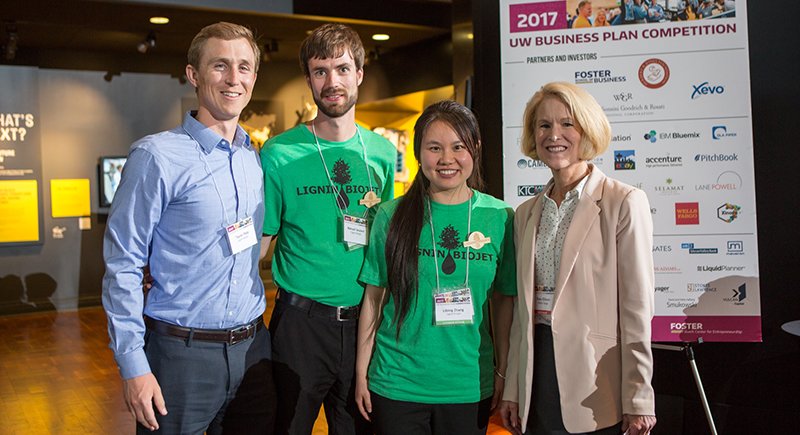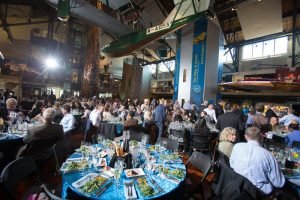
May 26, 2017 WSU Tri-Cities team earns CleanTech Big Picture prize at UW business competition
By Maegan Murray
RICHLAND, Wash. – A team from Washington State University Tri-Cities took home the Wells Fargo “CleanTech” Big Picture prize during the University of Washington’s Business Plan Competition this week.
With the award, the team, which includes Libing Zhang, a recent doctoral alumna, and Manuel Seubert and Taylor Pate, who are master’s in business administration students, was presented with a $5,000 check.

UW Business Plan Competition – May 2017
“We believe that we performed very well,” Zhang said. “We received extremely positive feedback regarding our business plan and presentation. Each team had a great product and were very convincing. We felt fortunate to be a part of it all.”
The UW Business Plan Competition has awarded more than $1.3 million dollars in seed funding to more than 165 student teams in its 20-year history. The competition started with 82 teams, which was then reduced to 36 teams for the investment round. The teams were then narrowed to the “sweet 16,” which competed this week in Seattle.
The WSU Tri-Cities team presented the process of taking lignin — a waste product in the cellulosic ethanol biorefineries and the pulping process — one of the most abundant renewable carbon sources on earth, and turning it into an environmentally friendly, cheap jet fuel. The process could potentially reduce the carbon emissions for commercial airlines. The technology was developed by professor Bin Yang’s lab in the Bioproducts, Sciences and Engineering Laboratory.
The competition featured a 15-minute presentation by each team to judges including University of Washington faculty, investors and local business owners and leaders. The teams then participated in a question and answer session with the panel of professionals.
“It is a great accomplishment and is really a tribute to the research that made it all possible,” Seubert said about the team’s success in the competition. “Our goal as a company is to implement this technology within the aviation industry and reduce global carbon emissions.”
The team has been accepted into the Cascadia CleanTech accelerator program, which is a 14-week program that delivers mentorship, curriculum, connections and funding opportunities designed specifically for early-stage cleantech startups. The goal of the program is to accelerate startup businesses.
“We are optimistic that we can finalize a partnership with Washington State University for this technology,” Pate said. “There is a significant amount of momentum behind Lignin Biojet and we hope to carry that forward as we move into the next phase of the company’s growth.”





